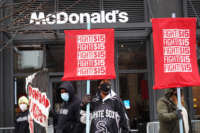
Fast food workers in 15 cities at chains like McDonald’s, Burger King and Wendy’s went on a Black History Month strike on Tuesday to protest low wages and demand a $15 per hour minimum wage. In some cities, the workers were also joined by fellow essential workers in home care and nursing homes to demand the right to join a union.
“For decades, McDonald’s has made billions in profit off the backs of workers like me, paying us starvation wages,” Taiwanna Milligan, a McDonald’s worker from South Carolina, told The Guardian. “I’m striking today because I need at least $15 an hour to survive and because I know the only way to make change is to stand up, speak out and demand it.”
A $15 an hour wage has become a benchmark among the left since the national Fight for 15 movement began with striking food workers in 2012. Since then, a $15 federal minimum wage has gone from a fringe demand to a mainstream sentiment, gaining the support of traditionally centrist President Joe Biden, who wrote it into his COVID stimulus proposal, and most Americans, polls find. Even Floridians, who voted for Donald Trump in the 2020 presidential election, voted to raise the minimum wage in the state to $15 on the same ballot.
The current federal minimum wage is $7.25. It has not changed in nearly 12 years, which is the longest it’s ever gone without being raised. With inflation, it’s worth 17 percent less than it was when it was first raised to $7.25 an hour in 2009; meanwhile, the cost of living has gone up nearly 20 percent in that same period.
Research has shown that a minimum wage increase to $15 an hour would be a huge boon to Americans and the economy, lifting the wages of 32 million workers, including nearly 60 percent of workers whose total family incomes are below the poverty line, according to the Economic Policy Institute (EPI). It would particularly be helpful for Black and Latino workers, who are on average paid less than white workers, EPI says.
The Congressional Budget Office (CBO) released a report last week that was more conservative and estimated that the wage increase would benefit 17 million workers. The CBO also said in the report that the raise would cost jobs, which many Republicans have since used as a bulwark against increasing the minimum wage. Economists and progressives, however, have disputed their findings.
A new report has also shown that Biden’s stimulus package, with a $15 minimum wage, stimulus checks and tax credits, would increase the incomes of the poorest 20 percent of families in the country by nearly 33 percent.
However, Biden has said that the minimum wage hike will likely not make it into the stimulus proposal, despite wide support. Republicans have remained staunchly against the proposal.
One of the fast food workers striking on Tuesday said that it was important for Biden to not give up on the minimum wage proposal. “My message to President Biden is it’s very important to pass this, it would make a big difference not just for me but for all the others that are struggling,” Texas McDonald’s worker Gloria Machuca told The Guardian.
Sen. Bernie Sanders (I-Vermont), chair of the budget committee, has also said that the proposal is essential and has been working on keeping the minimum wage increase in the stimulus, which is poised to pass Congress with a simple majority via budget reconciliation.
“I stand in strong solidarity with fast food workers all over this country who are going on strike today to demand $15 an hour and a union,” Sanders said on Tuesday. Sanders’s call for solidarity was echoed by fellow progressives like Rep. Pramila Jayapal (D-Washington).
Sanders continued, saying that “The Senate must raise the minimum wage to $15 an hour with 51 votes this year. We have got to end the crisis of starvation wages in America.” Sanders also said earlier this month that he has a “room full of lawyers” working on keeping the proposal in the stimulus.
Though the $15 minimum wage increase has been championed by the progressive movement, many on the left also say that a $15 federal minimum wage is not enough. Research has shown that if the minimum wage had kept up with productivity, it would be over $24 today. And MIT researchers found last year that a basic living wage in the U.S. for 2019 needed to be at least $16.54 an hour.
